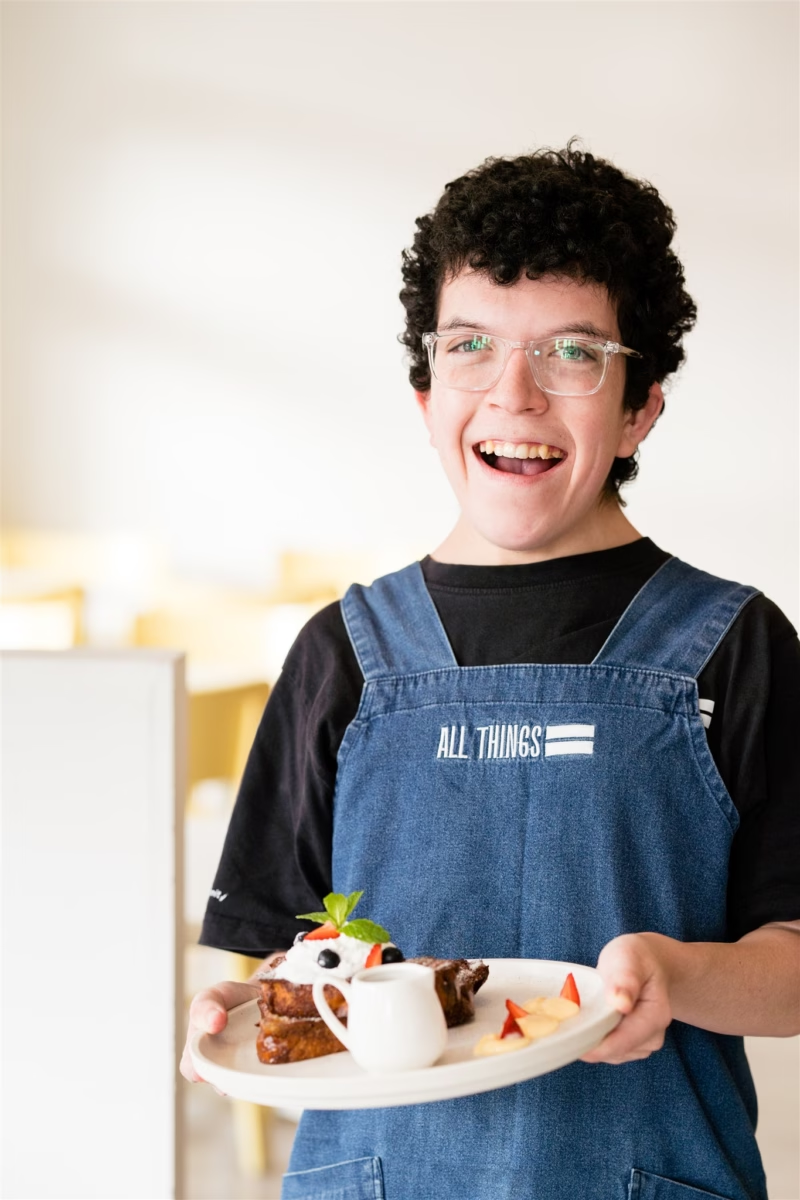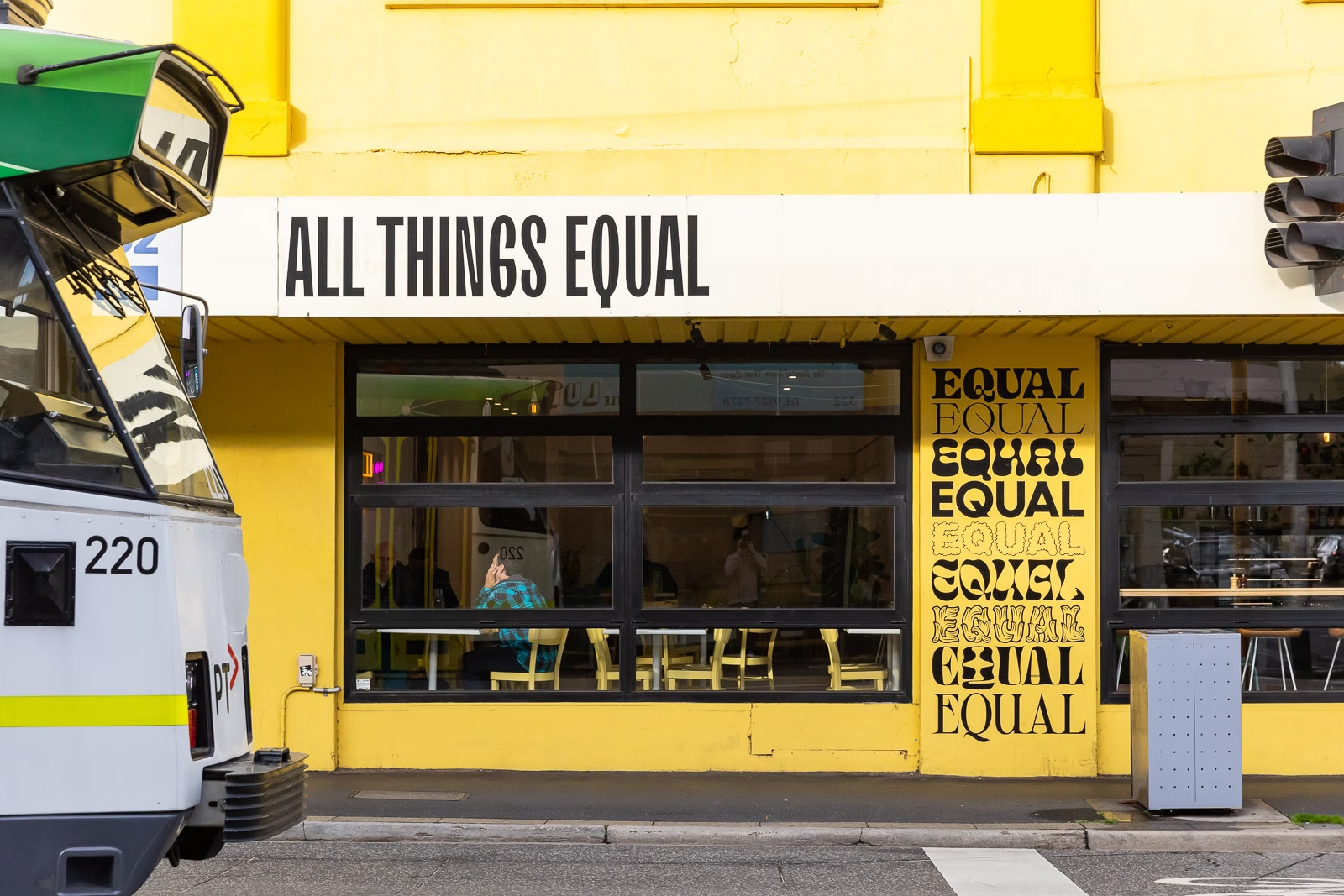In the bustling kitchen of All Things Equal’s training facility in Melbourne, Lloyd Clarke moves with quiet confidence between prep stations, his focus unwavering as he plates dishes alongside his colleagues. At 24, Lloyd represents something of a success story in Australia’s hospitality sector—not because his achievements are remarkable in themselves, but because opportunities like his remain frustratingly rare.
“I recently caught up with my friends, and out of five of us, only two of us have jobs,” Lloyd explains. “It’s not that people with disabilities don’t want to work—it’s also that employers aren’t always offering us these opportunities.”
Lloyd’s experience encapsulates a glaring contradiction at the heart of Australia’s hospitality industry. Whilst venues across the country struggle with severe staff shortages—with 20% of businesses reporting that understaffing is impacting their operations and service quality—a vast pool of willing and capable workers remains systematically excluded from employment.
The true scale of the challenge
The numbers paint a stark picture of missed opportunities. Australia’s hospitality sector employs 849,500 people, representing 6.7% of the total workforce, yet people with disability remain dramatically underrepresented. Despite workforce participation among people with disability improving from 52% to over 60% in recent years, they are still twice as likely to be underemployed compared to their peers without disability.
The economic implications are staggering. Research suggests that if Australia were to match the disability employment rates of top OECD nations, the national economy could grow by nearly $80 billion by 2050. For the hospitality sector specifically, this represents not just a moral imperative but a significant business opportunity.
“We have a workforce ready to go, we just need to give them a chance,” argues David West, Director of Human Resources at W Melbourne, part of the Marriott Group. His hotel has successfully reduced staff turnover from 52% to 33% in just one year by implementing inclusive hiring practices.
A three-stage solution
Enter All Things Equal, a Melbourne-based social enterprise that has developed what could be the hospitality industry’s most comprehensive approach to disability employment. Their innovative three-stage pathway, Access, Employ, Bridge, addresses the key barriers that have historically prevented the successful integration of workers with disability into mainstream hospitality venues.
The model begins with Stage 1: Access, a structured 12-month pre-employment programme where trainees develop hospitality skills in a supportive environment. Participants learn everything from food preparation and customer service to workplace behaviours and occupational health and safety. Crucially, this training takes place in real commercial settings through All Things Equal’s cooking school and café, ensuring trainees gain genuine industry experience.
Stage 2: Employ sees participants transition into paid roles within All Things Equal’s own operations, earning full award wages whilst continuing to develop workplace confidence and skills. This 12 to 18-month phase focuses on building essential workplace behaviours such as punctuality, teamwork, and communication, with each employee supported by a dedicated hospitality trainer.
The final stage, Bridge, represents the ultimate goal: placement in mainstream hospitality businesses. Here, All Things Equal’s comprehensive support system truly shines. The organisation handles everything from matching trained employees with suitable venues to providing ongoing workplace support and training, all funded through the National Disability Insurance Scheme (NDIS).
Addressing employer concerns
The brilliance of All Things Equal’s approach lies in its systematic addressing of the common concerns that prevent hospitality businesses from embracing inclusive hiring.
For employers worried about training costs and time, the model ensures candidates arrive job-ready, having completed extensive preparation. Concerns about workplace readiness are addressed through the comprehensive two-stage training process, whilst ongoing support from All Things Equal mentors provides reassurance for both employers and employees.
Perhaps most importantly, the financial risk to employers is minimal. The NDIS covers the costs of workplace adjustments and employment mentors, whilst employees are paid standard award wages. As Cherie Clonan, CEO of The Digital Picnic and a proud autistic leader, points out: “For every person we’ve retained long-term, we’ve saved up to $100,000 in recruitment costs alone. That’s the business case for inclusion right there.”
Proven results for hospitality
The evidence supporting this approach is compelling. Hotel Etico, Australia’s first social enterprise hotel, reports that 82% of its disability employment programme graduates secure ongoing jobs in the industry. These aren’t just feel-good statistics—they represent tangible business benefits, including lower turnover rates, improved customer engagement, and stronger workplace culture.
Lloyd’s journey exemplifies the potential of this approach. After building confidence and skills at All Things Equal, he successfully transitioned to a part-time role at Coles, proving that inclusive employment creates genuine pathways to mainstream workforce participation.

“Working at All Things Equal has made a huge difference in my confidence,” Lloyd reflects. “When I take on more responsibility, it makes me feel proud and gives me a real sense of purpose.”
The bigger picture in the blueprint
All Things Equal’s blueprint extends beyond individual success stories to propose systemic change across the hospitality sector. Their ambitious 10-year plan aims to create 1,100 jobs for people with disabilities by 2035, while training 4,500 hospitality employers in inclusive hiring practices.
The plan includes practical recommendations such as sector-wide disability employment reporting, strengthened collaboration between government, industry, and social enterprises, and clear career progression pathways that move beyond entry-level positions.
Dr Jenny Crosbie, Principal Industry Fellow at the Centre for Social Impact Swinburne, believes the hospitality industry is uniquely positioned to lead this transformation: “If major national and international hospitality brands committed to developing a customised role in every location, thousands of inclusive jobs could be created overnight.”
As Australia’s hospitality sector grapples with unprecedented staffing challenges, All Things Equal’s blueprint offers a compelling solution that addresses both immediate labour needs and the longer-term sustainability of the industry.
The question is no longer whether inclusive employment can work in hospitality—it’s whether the industry will embrace the opportunity to make it standard practice. The workforce the industry needs is already here. All that’s required is opening the door.







